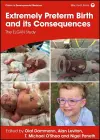
Extremely Preterm Birth and its Consequences
4 contributors - Hardback
£100.00
Olaf Dammann, Professor and Vice-Chair Department of Public Health, Tufts University School of Medicine, Boston. He trained in linguistics and informatics (U Hamburg), medicine (U Hamburg), epidemiology (Harvard), and philosophy (U Johannesburg). He worked as a pediatrician until he started doing research full-time in 1995. His main research topics are perinatal epidemiology with a focus on brain/retina damage in preterm newborns, and philosophy of science with a focus on causation and explanation. He has received research funding from the NIH, the European Union, and several private foundations. His bibliography includes more than 200 papers and the book “Causation in Population Health Informatics and Data Science” (Springer, 2019)
Alan Leviton, Professor of Neurology, Harvard Medical School, Emeritus head of the neuro-epidemiology unit, Boston Children’s Hospital. He has clinical training in neurology and research training in epidemiology, and devoted himself to identifying the exposures that most likely contribute to neurocognitive and physical limitations in high-risk children.
Thomas Michael O’Shea, MD, MPH, C. Richard Morris Distinguished Professor of Pediatrics and Division Chief for Neonatal-Perinatal Medicine at the University of North Carolina. For the past 35 years he has studied the epidemiology and prevention of neurodevelopmental impairments and related child health outcomes among individuals born prematurely. He was awarded the AAP Section on Neonatal-Perinatal Medicine Landmark Award in recognition of his study of the relationship of treatment with postnatal glucocorticoids to the risk of cerebral palsy among very low birth weight infants. He currently is the co-principal investigator for the third phase of the ELGAN Study.
Nigel Paneth, MD MPH, University Distinguished Professor, Departments of Epidemiology & Biostatistics and Pediatrics & Human Development, Michigan State University. He is a pediatrician and perinatal and child health epidemiologist with a particular interest in the causes and prevention of childhood neurodevelopmental handicap, especially cerebral palsy (CP).